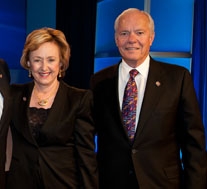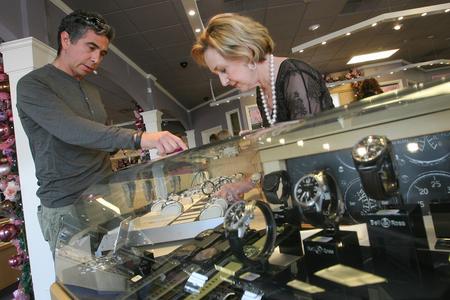Articles and News
Ellen Lacy’s Career Was Built On An Eye For Good Design | August 27, 2014 (0 comments)

El Paso, TX—It's hard to say what's most interesting about Ellen Lacy, formerly of Lacy & Co. Jewelers. Is it that she was a phenomenally successful jeweler and a former American Gem Society president? That she has a pilot's license? That she has a degree in mathematics and a minor in German (and speaks some Spanish)? Or maybe it's that she asks a LOT of questions and gets plenty of answers?
The Centurion caught up with Lacy via phone recently, at her and her husband Charles’s new residence in Santa Fe, NM. So just when did Lacy's jewelry career start?
"I literally grew up in my parents' store, Wood Jewelers, in Del Rio, Texas," said Lacy. "I was a year old when they bought the store. Mother and Daddy both worked in the store and my grandmother took care of me at home. They would work all day, come home for dinner and then go back many nights to finish up. My grandmother lived with us and took care of me during the day. She was very strict and I was very spoiled (not by her!) so I was always anxious to go back to the store at night with my parents."
She spent those evenings at the store studying silver patterns; she had hers picked out by the third grade. She says it was a serious, studied decision, one that she still likes today! She also made boxes and bows and cleaned silver "long past when I could have sold jewelry." She worked there during holidays in high school and college, but not too seriously. She graduated from the University of Texas with a degree in mathematics and a minor in German and then studied at the University of Madrid in Spain.
When she married, she and her husband returned to Del Rio and went into the jewelry business with her parents. For a number of years, she only worked while the children were in school and then would go home when they got out of school.
That was the pattern until the two divorced. At that point, she took over the operation and worked fulltime. Within a year, she met Charles (pictured together above) and ended up marrying a year later. They hired a manager to run the store and commuted back and forth to Abilene, Texas frequently (250 miles) since Charles owned an airplane that he used in his own business. Lacy jokes that she has had her pilot's license longer than Charles but he has flown "a million more miles than I have!"
It worked better in theory than in practice. They ended up closing the Del Rio store when it was 40 years old and opened a store in Abilene. Along the way, Charles became a permanent and important part of the business. After almost a decade in Abilene, the duo realized they needed a larger population to grow the business to the extent they felt they were capable of and after much research, moved to El Paso.
The family store that Lacy grew up in was on the Mexican border. "We knew that the Mexican people that we would do business with in El Paso would be good jewelry customers because my experience had been that higher income Mexicans had great appreciation for fine, well-designed jewelry. That proved to be true. But we also discovered an American population there that was also highly appreciative of quality and outstanding design. They had a taste level that we helped to nourish. That's when it starts getting fun. Their appreciation grows and it is a win-win situation."
Lacy says that nurturing the taste level of a certain segment of her customers was not difficult. "I have a talent (God-given--I can't really take credit for it!) for recognizing jewelry that is well-designed and balanced. If I realized that a customer had the potential of recognizing and appreciating really great jewelry, then I would start bringing it in. The truth of the matter is, few stores really have an amazing selection. And it is not that it isn't available. Their buyers simply don't recognize it. I'm not sure how you teach someone to recognize good design. I think it may be innate." Lacy did make it a point to nurture those customers who recognized good design.

Ellen behind the counter before she and husband Charles closed the store.
So did having a degree in mathematics offer Lacy an edge as a retail jeweler? "It helps in any business," says Lacy. "If you are a mathematician, you have a logical thinking brain. Part of it is figuring out quickly what the consequences of certain actions will be. For a long time, I thought everyone could do that. Then I had associates along the way with little logical thinking and realized it was not a common trait."
Lacey's logical brain knew that if "someone tries to reinvent the wheel, they are not going to live long enough to do it. To get where you aspire to go, you need some shortcuts along the way."
For Lacy, one of her shortcuts was to look at stores outside her area and see what they did so well. Then she would try to figure out how to replicate that in her own store. She also found mentors through the years that were kind enough to share some of their expertise. As time went on, she frequently was able to return the favor.
Lacy's advice for jewelers today? "Nurture a friendship of someone who is bigger and better than you are. Don't be too proud to admit you don't know something (or a lot of somethings!)." Another route that turned out to be a shortcut was getting answers from other jewelers. Lacy has always asked questions--a lot of them. If she heard about a non-competing jeweler doing something interesting, she would ask how they did it or ask if she could visit their store and learn. "Hardly anyone will turn you down if you honestly are interested with no ulterior motives except bettering your business. I always would give a person an out and say that I wouldn't be offended if they don't want to answer, but many people did answer and I let them know that I really appreciated it."
Lacy is always surprised by the people who don't want to ask. "So what's the worst that can happen? That someone will punch you in the nose?" she laughed. Clearly that's never happened to her.
While Lacy used certain strategies with fellow jewelers and customers, her employees were a different story. "I was talking to a former salesperson today," said Lacy. "She told me 'You were the sandpaper in my life.' And she felt she was giving me a compliment! She's now one of the top salespersons for Ben Bridge." Lacy says she ran a tight ship with basic but firm and fair rules for all the employees. "We were pretty strict and very serious. We laughed a lot but didn't negotiate on the things that were important."
Lacy compares managing employees to raising children. "In both cases, you have certain rules that are not negotiable. For the employees, those included: Get to work on time, never leave the front of the store unattended, lock the cases, and more along those lines. Many of our rules also kept our employees safe," said Lacy, who has had more than one former employee tell her, "We thought you were really tough but we really miss that now. We felt very secure then." Her employees also appreciated that the rules applied to everyone. No one got a free ride." They had a feeling of security that they took for granted. They have discovered now that it is not in every workplace."
Today, Lacy is retired after closing the store she and husband Charles owned. She's now reading books, enjoying daily workouts and traveling with Charles, all things that she didn't have enough time for when she was behind the counter in her store.
Join Ellen at the Select by Centurion Show in Dallas as she shares her story in person (with plenty of chances to ask questions)! Ellen will be speaking on Sunday morning, September 7, 2014, 9-10am.







